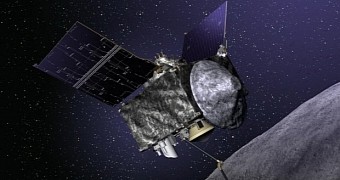Asteroid Bennu, otherwise known as 101955 Bennu or 1999 RQ36, was first documented in September 1999. It measures 492 meters (1,614 feet) in diameter, and like other asteroids, it is basically a big chunk of debris that was left behind when our Solar System formed nearly 5 billion years ago.
Since its discovery in 1999, asteroid Bennu has been extensively studied by astronomers. So much so that US space agency NASA now feels confident enough to launch a spacecraft to it to have a close look at its anatomy and its chemical makeup.
The mission, dubbed OSIRIS-REx (Origins-Spectral Interpretation-Resource Identification-Security-Regolith Explorer), will be a study and sample return mission, meaning that the probe NASA plans to send to explore Bennu will not only make in situ observations of its target space rock.
The agency expects its probe will manage to collect be it at least one sample of material from Bennu's surface and return it to Earth. A thorough analysis of this sample - or maybe more, if the mission proves really fruitful - should help researchers better understand the origin and composition of asteroids.
In case you were wondering, here's the timeline NASA has it mind: the OSIRIS-REx probe will leave Earth in September 2016, reach Bennu sometime in 2018 and return samples of it to Earth in 2023.
Some researchers are convinced Bennu packs organic materials
In a recent interview, OSIRIS-REx mission principal investigator Dante Lauretta of the University of Arizona in Tucson argued that, what with asteroids being debris from the formation of the Solar System, it's safe to assume Bennu packs organic materials, maybe even water and precious metals.
The research team hopes to reveal the space rock's composition with the help of a scientific instrument called OVIRS (OSIRIS-REx Visible and Infrared Spectrometer) and designed to document visible and near infrared light from Bennu as a means to identify the chemicals that compose it.
“We definitely believe we will find organic materials on Bennu and OVIRS's job is to find and identify these organics,” scientist Dante Lauretta told Phys Org in an interview.
Admittedly, organic molecules are widely considered the precursors of life, at least here on Earth. Still, this does not mean that an entire alien civilization might be lurking on asteroid Bennu, just waiting to be discovered. In fact, NASA researchers highly doubt the space rock hides life.
As Dante Lauretta put it, “We are also confident that microbial life does not exist on Bennu. A body the size of Bennu has too little atmosphere and gravity to protect any known life form from the ravages of space.” Still, finding organics on Bennu could mean that, as proposed by some, it was asteroids that seeded our planet with the right ingredients for life to emerge and thrive on its surface.

 14 DAY TRIAL //
14 DAY TRIAL //